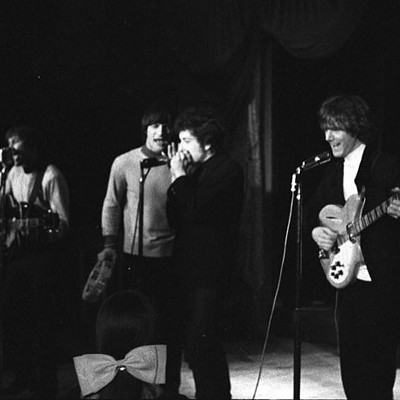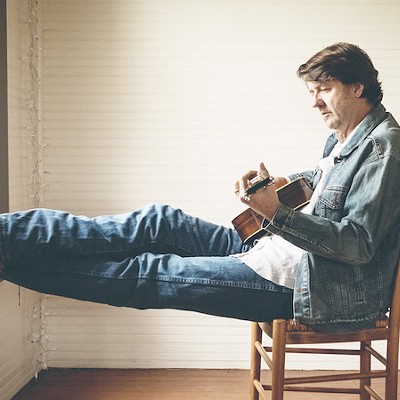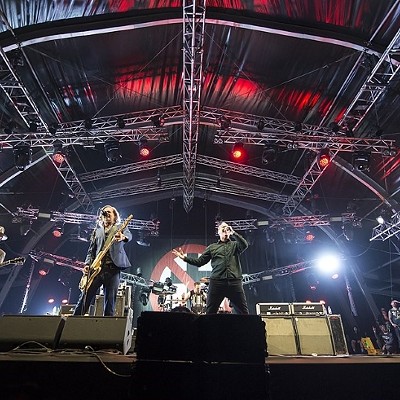The most surprising thing, and maybe the most amazing, about the 2012 edition of the Future Music Summit didn't take place during a presentation or during the concert. It took place during the afterparty at Herzstein Plaza just a little before midnight.
During the day, during presentations and meals, attendees of the festival heard plenty of discussion about music, technology and how humans interact with both. When it was time for the concert portion of the Summit, those attendees were not the only ones in the audience; locals from the Round Top area had stopped by the concert as well.
The locals, used to the more traditional classical performances that take place at the Round Top Festival Institute, seemed at first perplexed by the cyborg orchestra, the augmented violin and the DJ curator. In a concert hall in the present built for music of the past, they got a glimpse of the future.
The locals loved it.
But I'm getting ahead of myself.
The Past: The Saturday Night Concert
The symposia part of the Summit was the opening act for the Saturday-night concert. It was a chance to take the theories of the day's earlier presentations and turn them into practice.
The cyborg percussion ensemble known as Jazari started off the evening. At the center of the literal drum machines stood Patrick Flanagan, who used a controller and computer to fill the hall with beats and synthesized audio.
Flanagan had spoken earlier in the day about technology as the extension of human ability. Jazari might be the name he goes under, but there's no question that Flanagan is one of the funkiest one-man bands on the planet.
While the end result is electronic in nature, it's his presentation that separates Flanagan from your average DJ or producer. Real drums have a certain presence that sampled drums often lack. They give the performance a certain energy compared to the sometimes sterile feeling that samples have. Literal drum machines also make for an interesting bit of spectacle.
Violin virtuoso Mari Kimura can do incredible things with a violin and bow before technology enters the equation, but it's that use of technology that makes her performance unique among classical musicians.
Using a motion sensor glove to track her movements and a computer to interpret the data, Kimura is able to record her performance and manipulate the way it's replayed. It gives her the ability to accompany herself, going from solo violinist to single-person duet.
At one point in her performance, she allowed the audience to view what she sees on her computer on the projector screen behind her. It was an attempt to pull back the curtain on her methods and show the audience how her technology works.
It was the opposite of having a magic trick exposed. Rather than demystify the performance, it actually made it more impressive. Kimura reveals herself to be a virtuoso multitasker, having to read music, keep up with her computer program, be in control of her hand movements and play violin at the same time. It makes for a performance unlike any violin soloist's you've come across previously.
Part composer, part teacher, part storyteller, DJ Spooky closed out the evening with a series of compositions fusing the old and the new.
Consider his version of Bach's "Goldberg Variations." With a bit of inspiration via Glenn Gould, it starts off as an almost straightforward classical piece before being remixed and then remixed again into a final version that is a crushing bit of hip-hop. It was something that would sound at home in an alternate dimension where DMX went in over classical beats.
Talking to him after his performance, one of the things that Spooky stressed is that everything is information, and all information can be used by composers. Music can be a collage.
This idea was most evident in his set closing "Winds of Change." The piece, originally commissioned by the NAACP, combines live strings, hip hop beats, sampled audio and archive video to teach a 100-year history lesson. It's a powerful message on video, but in a live setting the way he manipulates his audio, interacts with his string players and keeps in time with the video made for an emotionally satisfying conclusion the concert.
The Present: Three Theories
After six hours and eight presentations, here are three theories on the future of music:
1. The Democratization of Music: Technology will only get better, faster and more affordable. The entry into making music, the ability to spread your music and the tools to find new music are cheaper than ever.
Good music-making software is already available for your computer for under $300, and the tools to make your own instruments aren't too expensive through the right manufacturers. A record label might be able to get your album in Walmart, but for the price of a camera and the right idea, you can get 20 million views on Youtube.
This is good because it means more people get involved in the musical marketplace of ideas. New and better technology on the horizon will keep this trend going, enabling anyone who wants to make and share music to be able to.
2. Cyborg Musicality: Those two words might conjure the image of a Robocop playing the guitar, but the term is a description for the interaction of man and technology when it comes to making music.
One part of it is using technology as an extension of human ability. A guitar player, for example, uses pedals to shape his sound in ways that go beyond what he can do with the instrument and his hands. Now imagine a guitar pick that tracks your hand movements and shapes the sound depending on how you strum the guitar. (The bass player from Pinn Panelle does something similar in this Skrillex cover.)
The other side of cyborg musicality is using technology to compensate for musical weaknesses. If you can't sing naturally, you may turn to autotune to make you sound better. That's cyborg musicality in the mainstream.
As technology gets better and smaller, it's not a great leap to think that there will be new and more varied devices out there to augment performance past guitar pedals and vocal synthesizers.
3. Sense Events: Part of a good performance is the right ambience. From the preshow music to stage lighting and set decoration, the right mood can take a good performance to a great one in the eyes of the audience.
But there are other ways to control ambience.
Imagine a tour where the band brought their own performance space with them, one that they have total control over. They could use temperature, smell, image projections, even vibrations in the floor to create a certain atmosphere for their performance. By thinking past just sight and sound, musicians can create a meaningful experience based around all the senses.
This kind of performance won't kill off your standard night out at the club, but it might make for an interesting alternative for more conceptual musicians.
The Future: Future Music Summit 2013
In talking with event organizers after the concert, it was clear they were happy with how the day went and there's a solid commitment to make the Future Music Summit a yearly event. And even on the night of their first full day, they were already thinking about what next year might have in store.
"We want to continue to nurture the concept of keeping elements of classical music involved," said Derek Woodgate, Chief Creative Officer for Plutopia Productions. It's that classical element that helped to bring in those locals I mentioned two pages back.
I took one look back at the plaza as I was leaving for my drive back home and what struck me as surprising/amazing was just how many of the older locals had stayed for the afterparty. People who may never have thought about the future of music flocking to talk to DJ Spooky about his compositions or Flanagan and his cyborg orchestra.
Like hip-hop beats and classical strings, violins with motion sensors, and futuristic beats in a classical hall, the lasting image of the night is older and younger fans of music coming together in the present to talk about the future. If the locals from Round Top, Texas (population 90), can find interest in the future of music, it's only a matter of time before others do too.
Or like Maggie Duval, Plutopia CEO, told me, "When people hear about this, they're going to wish they had been here."
Follow Rocks Off on Facebook and on Twitter at @HPRocksOff.






